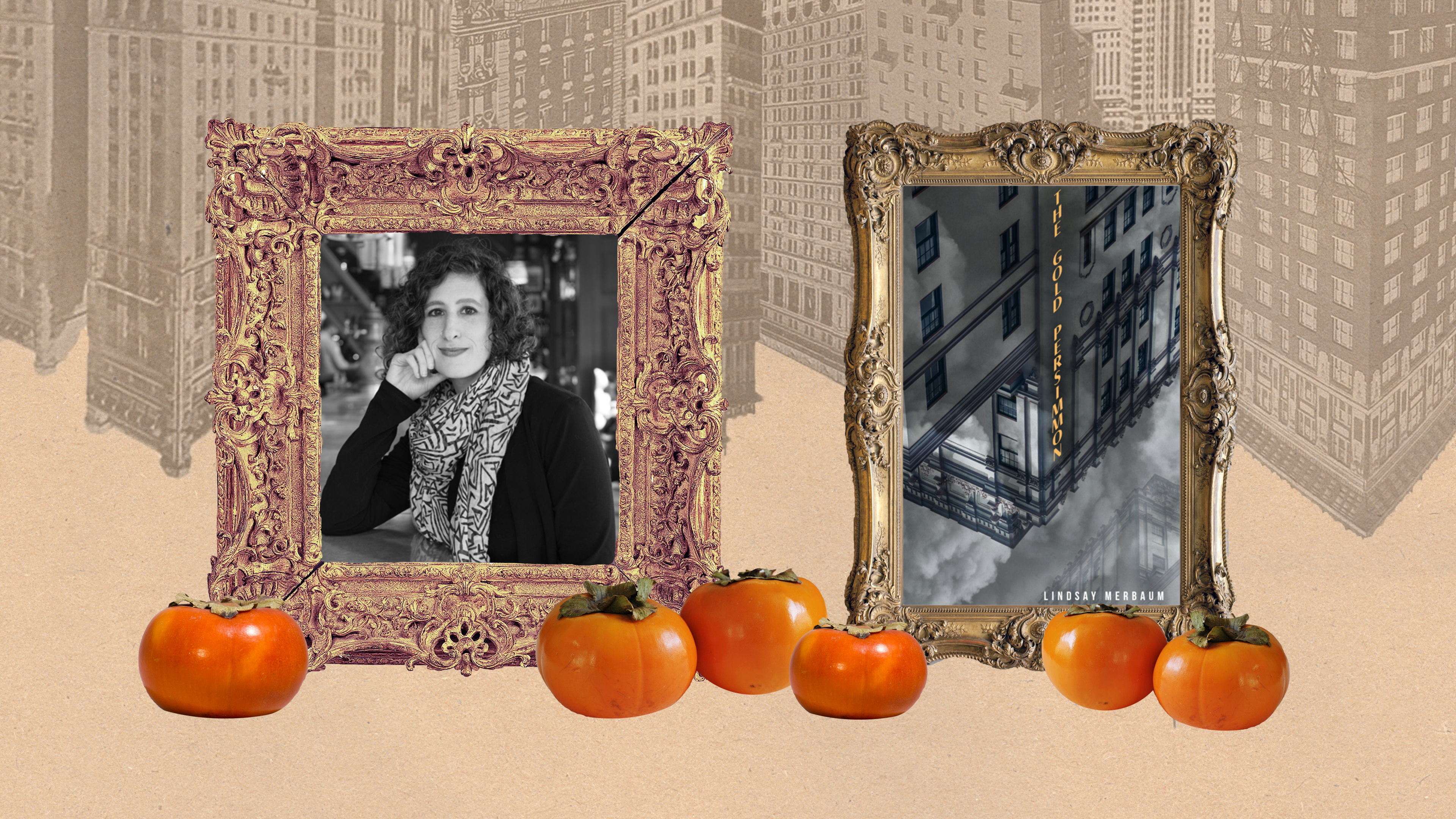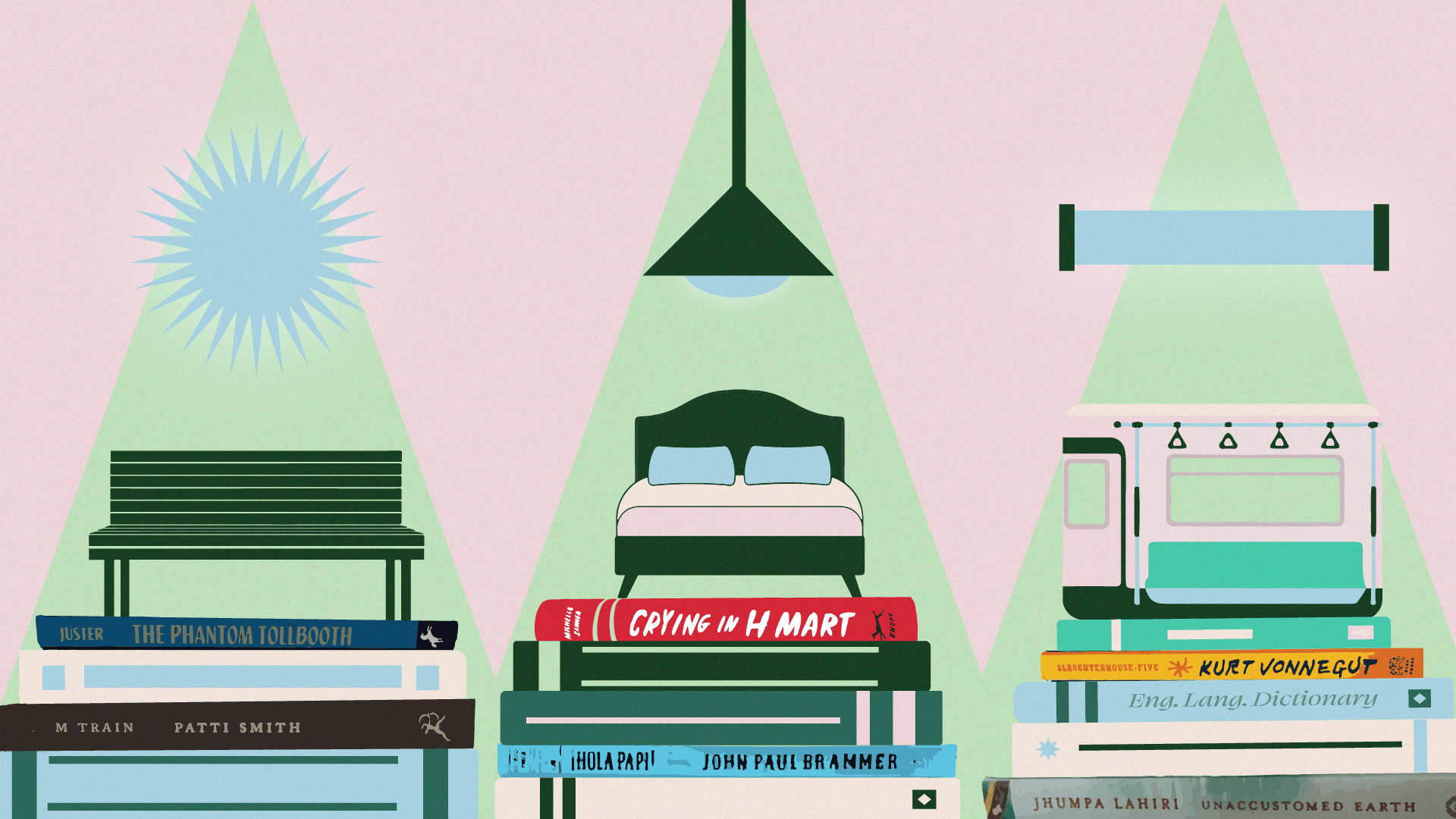
Lindsay Merbaum’s ‘The Gold Persimmon’ Haunts the Halls of Luxury Hotels
Grief, sex, and the allure of anonymity draw people to the hotels at the center of this novel.
Booking a hotel room is a ritual of escape: soft robes, sheets changed by someone else, fantasies of room service on silver platters. For guests, checking in means checking out of everyday responsibilities. The same cannot be said for hotel staff. Described on HBO’s The White Lotus as “pleasant interchangeable helpers” who offer “an overall impression of vagueness that can be very satisfying,” receptionists, maids, and other workers often endure much less enjoyable experiences.
In The Gold Persimmon, Lindsay Merbaum’s debut novel, the demands of the hospitality industry are laced with dread as two characters navigate secretive hotels and personal horrors. Clytemnestra is a check-in girl at the titular Gold Persimmon, a discreet luxury hotel in New York City where guests come to grieve in private. She appreciates the hotel’s strict protocols, soundproofed rooms, and minimal interactions with guests. That is, until one named Edith pursues her romantically, simultaneously threatening Cly’s job and giving her space to explore her newfound sexuality.
In a parallel reality, Jaime, a nonbinary writer, arrives at the Red Orchid — a sex hotel with similar promises of privacy — for a job interview. A mysterious fog quickly engulfs Jaime’s New York, trapping them inside with a handful of guests and employees. Panic sets in and themed rooms resembling the Garden of Eden, an airplane bathroom, or simply filled with sex dolls transform from tantalizing to terrifying. Between bacchanal feasts in an abandoned kitchen and deadly power struggles, Jaime emerges from their shell just as the world closes in around them.
Through rich prose and an open-ended plot structure, Merbaum crafts a sensual, scary, and surprisingly hopeful story about survival. The queer feminist writer uses liminal spaces, locked doors, and hushed corridors to explore Jaime and Cly’s ambiguous relationships to grief, love, family, and their sense of self. Long after finishing The Gold Persimmon, readers will yearn for an extended stay within this tale.
Merbaum spoke with The Interlude about The Gold Persimmon, being a good literary citizen, and the need for more LGBTQ protagonists across all genres of fiction.
First of all, congrats on your debut novel! You’ve previously written essays and award-nominated short fiction. How did your creative process evolve as you wrote The Gold Persimmon?
I knew from a very young age that I wanted to be an author. So throughout my college education, throughout getting my MFA, the long-term goal was always to write a novel. But the way that you become educated about fiction and often the way that fiction writing is taught is through short stories. So I spent many years writing stories and trying to figure out how I could actually transition from stories to novels, especially because it’s such a big commitment. You’re committed to those characters and that storyline for years, potentially. I have written a couple other books before this one that were kind of like practice for me, sort of a ramp up. By the time I got around to writing this, I was starting to find the kinds of characters and the kinds of stories that could keep my attention for extended periods of time. The process with this book was a long, difficult one. It was really like wandering my own way through a labyrinth, trying to figure out how to put this book together.
The twin hotels at the center of your novel are brimming with secrets, pain, and pleasure. Characters get lost and lose themselves within their halls. What draws you to hotels as sites for strange and scary experiences? And were there other hotels, fictional or otherwise, that you kept returning to as you wrote?
I’m really fascinated by hotels as liminal spaces. They are both public and private. Many things happen there that are seen and unseen. There’s a whole hive of workers making the hotel’s functioning possible. I also am really interested in the Japanese-style love hotels — which definitely comes out in part two of my book — which provide spaces for people who don’t have somewhere to go to be alone to be together and be intimate, but also to explore a lot of fantasies. If you’ve ever seen photos of such hotels, the rooms often have really specific themes, like an igloo or a doctor’s office or something like that. So I definitely continued to think about that and return to that.
But I also just thought about some of the more opulent or classier hotels that I’ve seen in my life, even if I didn’t get to stay there myself, and the kind of mystery that they offer by virtue of presenting a very polished front that is designed to create a certain experience for the guests, regardless of what’s really going on behind the scenes. In fact, as research, you could say, for this book — I was living in San Francisco when I wrote most of it — I booked a room at a rather nice hotel in downtown San Francisco, and stayed there with my notebook, writing characters and trying to imagine myself inside a room and what I might be experiencing.
Your main characters, Jaime and Cly, are coming of age while grappling with immense uncertainty and disaster. I couldn’t help but draw parallels between their stories and the lives of young adults during the pandemic, and, more broadly speaking, in the face of climate change and late capitalism. What’s one thing you want readers to take away from The Gold Persimmon?
That is a great introduction to that question. And it’s interesting, because, of course, the pandemic hadn’t happened yet, when I wrote it, and yet ended up feeling sort of predictive in some way. One takeaway…there’s so many takeaways. I would like for readers to maybe look at this book and think about the nature of storytelling itself. Sometimes we get really bogged down on the details of “What exactly is happening, and how does the story wrap up, and what is the precise ending?” But this book is as much about storytelling itself, as it is the story contained within the novel, in the sense that through Jaime’s experience, through their trauma, and the way that gets reconstituted into their own narrative, we get a little glimpse into what the writing process actually looks like from the inside, and how writers take in all of the stimulus around them like a filter, and then turn it into something else. While speaking at the same time to their own experience. That’s one thing, but I could probably think of many others.
Jaime and Cly also join the slow-growing ranks of LGBTQ protagonists in the horror genre, Jaime being a nonbinary writer and Cly exploring her attraction to women. What are your hopes for the future of LGBTQ stories in the genre?
I would say, and this is beyond the genre as well, I hope to continue to increase visibility and diverse representation. For me, it’s really important to write a diverse cast of characters, because that is the reality in our lived experiences in our world, and it feels like a missed opportunity to not do that, and to narrowly focus on characters that maybe have the same background or ethnicity as the writer themselves. I would love to see a greater diversity of nonbinary characters out there in a variety of forms, in terms of how they present their gender, what their personalities are like, what happens to them. I would love to see more stories with pansexual protagonists where we’re not narrowly trying to fit them into a certain box of sexuality, and where also that fluidity is just taken for granted and accepted. That the fact that someone is different is not necessarily always cause for conflict or a catalyst in the story itself, but also that there are just characters who match who is out there in the world. Characters that allow people in the queer community, like myself, to see ourselves represented and to feel that connection, and that way of being seen.
Totally! You’ve been making ‘booktails’ lately — cocktails and mocktails based on contemporary fiction, including your own. Can you tell me about your mixology process?
Yes. So I am a big eater and drinker. I love all the sensual pleasures of life. I started making my own cocktails a few years ago, really. Before the pandemic, I was still living in California, and I was doing some creative coaching workshops and things and I was making cocktails on theme for those events. Honestly, the guests really liked the cocktails better than anything. So when I was talking to my publishers about creative ways to promote this book, or connect with readers, I said, “Okay, I’ll make a cocktail for it.” Right? Not realizing what I was necessarily signing myself up for. That took some months. I did six pairings, so six cocktails and six mocktails. It was really fun to try to express the experience of the book or the mood of the book through taste and smell, and other very tactile senses. But it’s also a lot of work.
When I was finished with that, I was looking around and thinking, “Okay, well, what can I do to help other writers?” I’ve joined all these groups with other writers who have books coming out [and] we’re all trying to support each other. Writing is a team sport, so they say, and I thought, ‘I’ll just offer to make booktails for other people’s books, as well.’ I honestly didn’t really know what kind of response I would get, and it kind of blew up from there. I am currently just inundated with manuscripts to review and turn into cocktails. It’s a way of talking about what my experience of their book was without actually completely using my words. It’s a more visceral experience, and I think it has great emotional weight for that reason. And it’s really fun.
How wonderful. On Twitter, you posted about potentially getting a tattoo to commemorate publishing The Gold Persimmon. Can you talk about the importance of artists celebrating their own work?
Yeah! I have a few different tattoos, all of which are meaningful for me, and I definitely think that every book that I publish will probably have some tattoo somewhere on my body to commemorate that. When you’ve worked for many, many years towards a specific goal, you imagine in your mind over and over and over how that’s going to go, and how you’re going to cry, and how you’re going to feel, and how you’re going to shout from rooftops and post all over Facebook. And the reality is often very different. Because there isn’t one moment when you’re publishing a book, there’s a series of moments.
So there’s all these milestones along the way, and instead of that contributing to more excitement, it often contributes to a blah feeling of like, “Okay, well, this is just the process.” At the same time, you’re so focused on the work that’s involved with promoting your book, making sure that it’s getting reviewed, going back and forth with your publisher on any number of details, that sometimes it doesn’t feel super special. So I think getting inked for this book, putting something indelible on my body to honor it — that’s a way of reminding myself about its importance. I think that’s a way of carrying it with me through the rest of my writing career.
Do you have any advice for early-career writers? Especially Gen Z writers interested in fiction?
Writing is not for the faint of heart. It’s a tough industry, and as it continues to evolve there are new ways to connect and get your work out there. But there also are additional challenges. So I would say to any young writer out there, especially a queer writer: be a good literary citizen, connect with other writers, read their work, support their work, talk about their work, when you read a book that you really connect with. Even if you think the writer is, like, far too famous to take notice of you, send them a note. Contact them to tell them what the book meant to you. Because a lot of people don’t do that. Writers are not as inundated with these messages as you might think, and there’s no way in which telling someone they did something amazing is a bad thing. There’s no way to be offended by being complimented about the value of your work. Every writer wants to hear that. The other consequence of reaching out continually and supporting other people’s work and really trying is that you start to build a network, you can get more information about how publishing actually works — because there’s a lot of ins and outs that you aren’t going to learn just on the face of it, no matter how much research you do. Then, when it’s your turn, you’ll have other people there for you, excited for your work, cheering for you, eager to review it or write a blurb. That makes the process so much easier.
Writing is a solitary thing. So sometimes we think, “Okay, it’s just gonna be me alone, and I can’t tell anyone what I’m writing until I have a book deal, and I can’t talk about it until the book deal.” And that’s just simply not true. Sharing of yourself and what matters to you and other people often fosters connection. If you want to emotionally succeed as a writer, in addition to the more traditional parameters of success, you’re going to need support, and you’re going to need friends. So be friends with other writers, be kind to them, and be kind to yourself.
This interview has been edited for length and clarity. The Gold Persimmon is out Oct. 5, and you can order it here.


